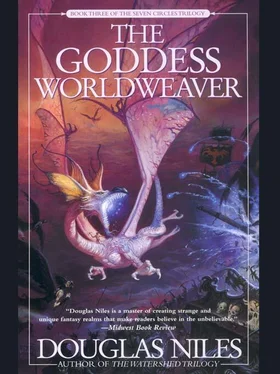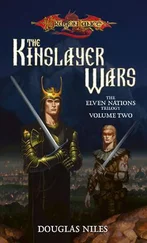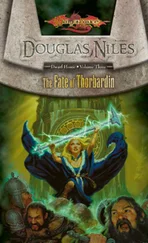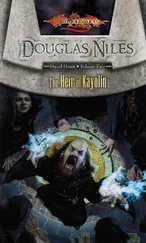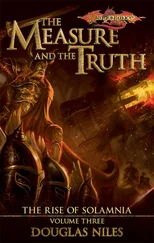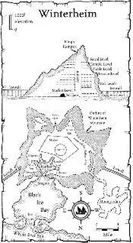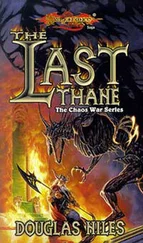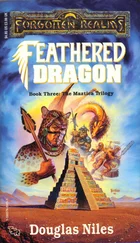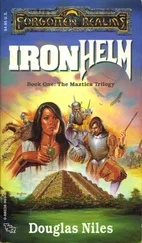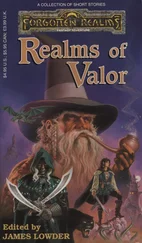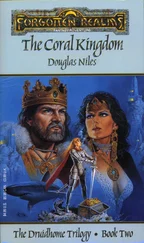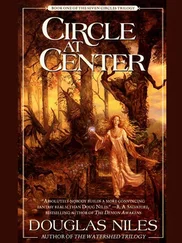Douglas Niles - Goddess Worldweaver
Здесь есть возможность читать онлайн «Douglas Niles - Goddess Worldweaver» весь текст электронной книги совершенно бесплатно (целиком полную версию без сокращений). В некоторых случаях можно слушать аудио, скачать через торрент в формате fb2 и присутствует краткое содержание. Жанр: Фэнтези, на английском языке. Описание произведения, (предисловие) а так же отзывы посетителей доступны на портале библиотеки ЛибКат.
- Название:Goddess Worldweaver
- Автор:
- Жанр:
- Год:неизвестен
- ISBN:нет данных
- Рейтинг книги:5 / 5. Голосов: 1
-
Избранное:Добавить в избранное
- Отзывы:
-
Ваша оценка:
- 100
- 1
- 2
- 3
- 4
- 5
Goddess Worldweaver: краткое содержание, описание и аннотация
Предлагаем к чтению аннотацию, описание, краткое содержание или предисловие (зависит от того, что написал сам автор книги «Goddess Worldweaver»). Если вы не нашли необходимую информацию о книге — напишите в комментариях, мы постараемся отыскать её.
Goddess Worldweaver — читать онлайн бесплатно полную книгу (весь текст) целиком
Ниже представлен текст книги, разбитый по страницам. Система сохранения места последней прочитанной страницы, позволяет с удобством читать онлайн бесплатно книгу «Goddess Worldweaver», без необходимости каждый раз заново искать на чём Вы остановились. Поставьте закладку, и сможете в любой момент перейти на страницу, на которой закончили чтение.
Интервал:
Закладка:
“A bad sign,” Rufus agreed. “But we can’t know they were sent there under King Lightbringer’s orders. You know that Nayfal has complete command of the garrison.”
“Nayfal!” Darann all but spat the name. She drew a breath, conscious that her emotions might be visible on her face. And there was no way to know who was watching the house, lurking in the darkness beyond the beacons. At least she consoled herself that the fountain’s noise made it impossible for them to be overheard.
“Have faith, daughter,” Rufus said gently. “I have some indication that I might be invited to the throne room, perhaps within the next ten cycles. We have survived travails before. You should know that this, too, shall pass.”
Later, as she walked backed to her apartment in one of the city’s Six Towers, she reflected on her father’s words. Try as she might, she found his sentiment impossible to believe.
4
The Prussian
Shrouded sunset,
On long horizon;
Canvas clouds approach.
Crimson rain,
Yields only crop
Of carnage.
From The Ballad of Seafall by Sirien SaramaydThough his death had occurred more than forty years ago, Fritzi Koeppler stood on his command deck and remembered the moment as if it had been just last week. Circumstances could not have been more different: then, he fought on a horse; now on a boat. Then he had joined a great army battle, part of a clash between two prideful and nationalist leaders; now he raced toward a sea fight, battling for the destiny of all creation.
Nevertheless, as he led his flotilla of more than three hundred druid boats, his mind inevitably turned to that other fight, his last battle-indeed, his last experience of any kind-upon the world of his birth.
He had been a minor leader in the hierarchy of a mighty army, his command a battalion of crack Prussian cavalry troops. Together with hundreds of thousands of men and hundreds of lethal cannons, he had gone to make war upon France.
He had enjoyed heady success during the start of the campaign, in the summer of 1870. Under the command of King Wilhelm I and the able leadership of General Moltke and his modern, efficient general staff, the Prussians and their Germanic allies chased the hapless French back from the border with dazzling attacks through Strasbourg, Nancy, and Metz. Finally the invaders trapped the enemy force, more than 200,000 strong, within a bend of the river Meuse, at Sedan. There would be no escape for the army of Napoleon III: even a humiliating crossing into neutral Belgium would be the equivalent of unconditional surrender. So the French would stand; the Germans, attack.
The heavy Krupp guns pounded relentlessly, lethal shells plunging into packed ranks. Fritzi could still feel, smell, hear his own mare, the big horse prancing and snorting under the noise of the bombardment, eager to charge. She was a powerful creature, black and sleek and vibrant, and he longed to unleash that power. He watched shells whistle overhead, witnessed the obliteration of breastworks, fortifications, and men.
The French fought with courage, the thumping cadence of their heavy, primitive machine guns, called mitrailleuses, chattering in the background of the barrage. These innovative devices were mounted upon two-wheeled frames, like light artillery pieces, and fired a rapid fusillade of bullets through a series of rotating barrels. Many Prussians had fallen to the deadly fire, but the weapons were mostly useful for harassing skirmishers; they seemed to have little place on the field of an epic battle. Truly, the new weapons were no match for crunching, well-organized artillery.
But guns alone would not decide this battle, and so the cavalry moved up in the time-honored fashion. The French formations were badly battered, clearly weakened and ready to break. Closing his fist around the hilt of his saber, Fritzi looked at the ragged lines, the infantry battalions torn and gashed by the fire, and his heart pounded with excitement. The horses would cut through those ranks, the enemy army would break, and the war could be won-all with one epic charge. After a lifetime in the saddle, he knew there could be no better way to decide the affair.
His mare shared his excitement, snorting and kicking, restless in the close formation. All along the battalion’s lines equine nostrils flared, hooves stomped, and manes blew in the wind. Then came the signals: pennants up, horns braying, the huge animals advancing at a walk, a trot, surging into a canter. The ground itself seemed to tremble under the impact of many thousands of hooves. Finally the steeds broke into a gallop, thundering across the field, the surge of attack drowning out all other sensations. French cannons fired sporadically, shells that screamed past or, occasionally, exploded among the lines of men and steeds. The bloody gaps in the cavalry ranks quickly filled, elite troops merging to tighten ranks, still maintaining the frenzied momentum of the charge. Already some of the enemy troops fled, panicking in the face of death; Fritzi’s lip curled in disdain of this shameful cowardice.
Now the French troops stood visible before them, in line formation-they had not even formed the squares that were the traditional defense against such a charge. Fritzi leaned low, murmuring words of encouragement into the mare’s laid-back ear. A few small guns stuttered here and there, the squat and toylike mitraillueses opening up as the charging cavalry came closer.
And then a strange thing happened. Those little chattering guns began to sweep their fire-streams of mere bullets, not the explosive shells of true artillery-across the front of the Prussian horsemen. Men and mounts fell in gory tangles, bodies forming an instant breastwork, breaking the tight ranks. Some of the trailing horses leaped the fleshy rampart, only to perish in the continuing volleys; others tripped and stumbled through the chaos of suffering, thrashing flesh. Still those pesky little guns fired, barrels smoking as they spun through their rotating cylinders. Everywhere horses were rearing and kicking, men were falling, and both mounts and riders were dying.
The charge was not merely broken but utterly shattered. The realization came to Fritzi as he lay on the ground, his broken leg pinned by the weight of his dead horse: warfare had changed, changed fundamentally and forever. He was saddened and ashamed, for it seemed that all glory had been taken from this most glorious of pursuits. It was not long before the French infantry came forward, bayonets glittering, and Fritzi lacked the strength or the will to reach to his belt and draw his side arm. Everything was sad and wasted, and for what kind of world?
At the last, when a razor-sharp bayonet plunged through his throat, he was ready to die.
“You were thinking of that day again, Sedan? Were you not?” Reza asked the question directly, his brow furrowed with concern. The big Persian sat at the tiller, the wooden bowl in his lap as he effortlessly rotated the windspoon with his free hand. The gust he cast swirled upward, filled the sail, propelled the boat with all the power-and none of the noise or smoke or heat-of a good-sized steam engine.
“Yes,” Fritzi answered, shaking his head as if to physically break free from the reverie. He could see the white sails, the blue sky, the sun-dappled water. Ahead, on the horizon, the darkness of the armada lay like a stormy murk. With that glance, and the smell of the fresh, salty air, he returned to all the truths of this place and this day. “You know, that was my last battle… until now. When Gretchen summoned me to Nayve, I allowed myself to believe that my days of war were over. But now…” He gestured vaguely in the direction of the dark, stormy fleet.
Reza nodded, his dark skin growing smooth as his expression became more peaceful. “Today looks to be a battle that will make them all, from Salamnis to Traflagar, seem but skirmishes.”
Читать дальшеИнтервал:
Закладка:
Похожие книги на «Goddess Worldweaver»
Представляем Вашему вниманию похожие книги на «Goddess Worldweaver» списком для выбора. Мы отобрали схожую по названию и смыслу литературу в надежде предоставить читателям больше вариантов отыскать новые, интересные, ещё непрочитанные произведения.
Обсуждение, отзывы о книге «Goddess Worldweaver» и просто собственные мнения читателей. Оставьте ваши комментарии, напишите, что Вы думаете о произведении, его смысле или главных героях. Укажите что конкретно понравилось, а что нет, и почему Вы так считаете.
